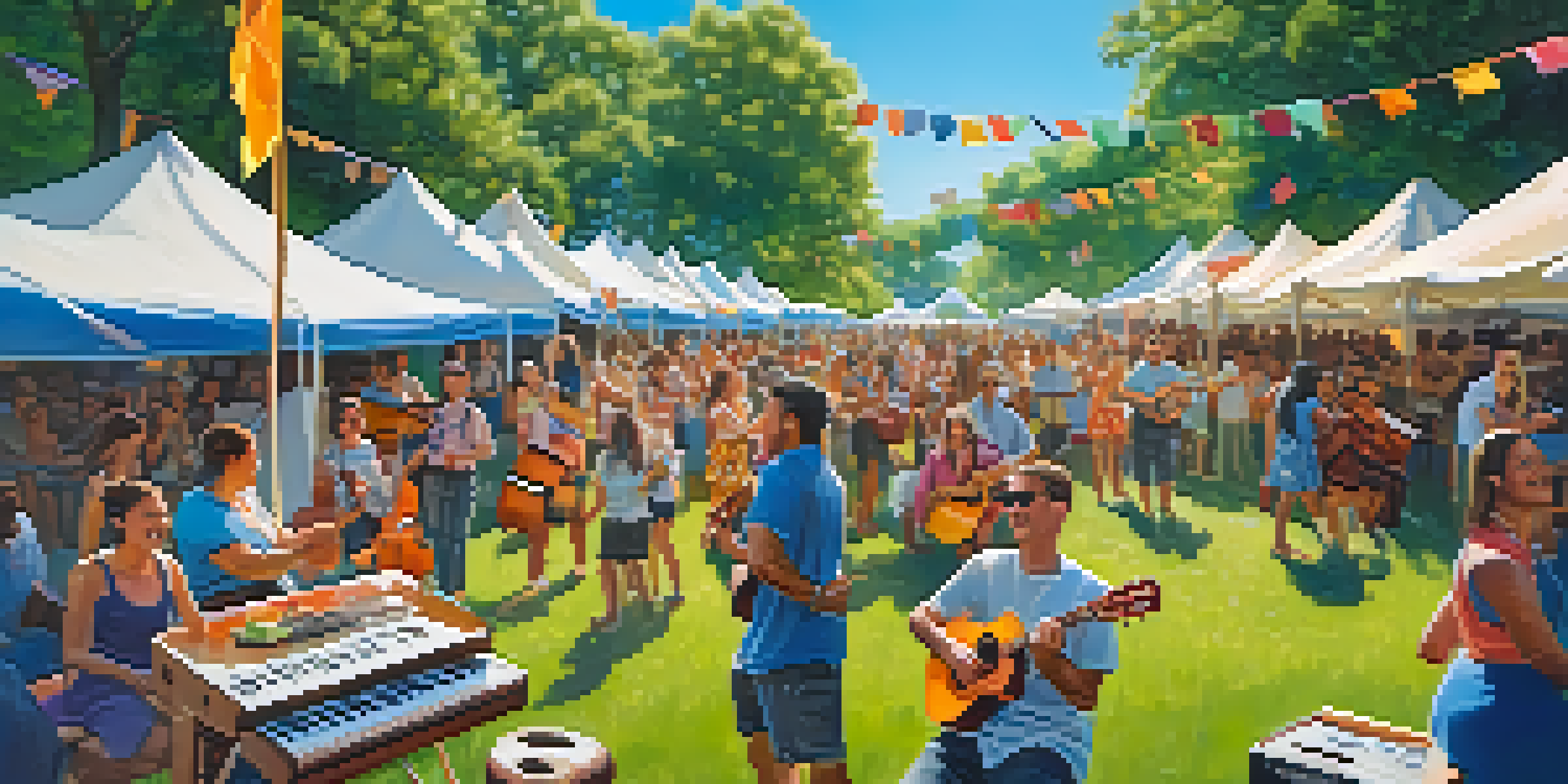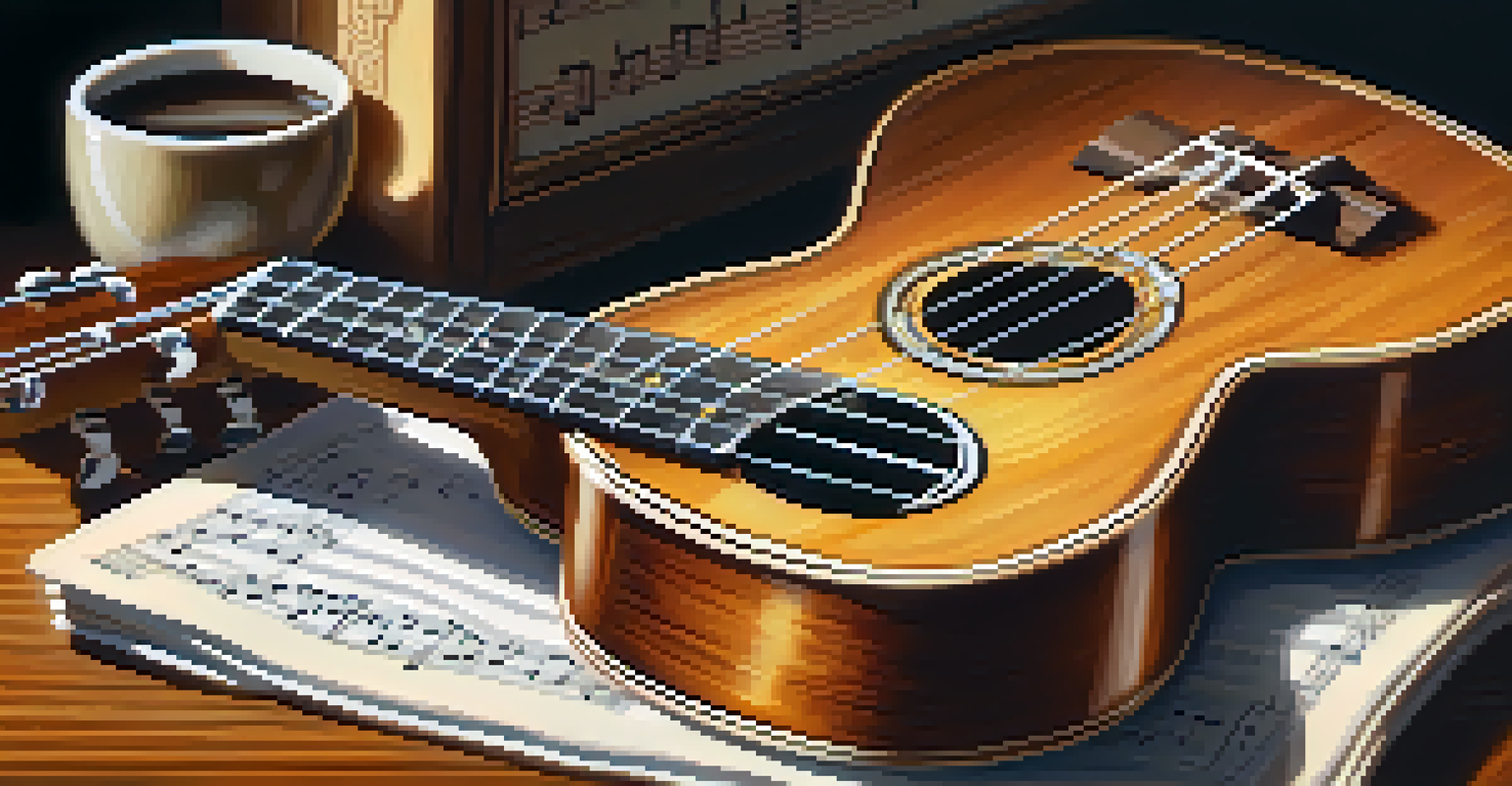The Influence of Ukulele in Contemporary Pop Music Trends

The Ukulele: A Brief History and Resurgence
The ukulele, originally from Hawaii, has a rich history that dates back to the late 19th century. Its cheerful sound and portability made it a favorite among musicians and casual players alike. In recent years, this charming instrument has seen a resurgence, partly thanks to social media platforms showcasing its versatility.
The ukulele is a small, lovely instrument that can give you a big sound and a heart full of joy.
Artists like Jake Shimabukuro have brought the ukulele into the spotlight, demonstrating its potential beyond traditional Hawaiian music. This revival has led to a new generation of musicians embracing the instrument, integrating it into various genres, including pop, rock, and folk. The ukulele's bright tone adds a refreshing quality to modern compositions, making it an appealing choice for songwriters.
As the ukulele continues to gain popularity, it’s becoming a staple in contemporary pop music. Its accessibility and ease of learning encourage even novice players to experiment, thus fostering a vibrant community of musicians who share their creativity online.
The Ukulele's Role in Shaping Modern Pop Sound
In contemporary pop music, the ukulele has found its niche as a unique sound that stands out against synthesizers and electric guitars. Many artists incorporate it into their tracks, creating a warm, inviting atmosphere that resonates with audiences. This trend can be heard in catchy hits that utilize the ukulele to evoke feelings of joy and nostalgia.

For instance, artists like Ed Sheeran and Jason Mraz have used the ukulele in their songs, blending it seamlessly with other instruments. This harmonious mix allows the ukulele to contribute to the overall vibe without overshadowing the main melody. Its playful sound often complements lyrics that focus on love, adventure, and carefree living.
Ukulele's Rise in Pop Music
The ukulele has emerged as a staple in contemporary pop music, appealing to both musicians and audiences with its cheerful sound and versatility.
Moreover, the ukulele's presence in pop music often aligns with the genre's current trends, like a focus on acoustic sounds and organic instrumentation. As listeners seek authenticity in music, the ukulele provides a refreshing break from digitally produced sounds.
Social Media: Fueling the Ukulele's Popularity
Social media platforms have played a significant role in popularizing the ukulele among younger audiences. Platforms like TikTok and Instagram allow musicians to showcase their ukulele skills, reaching a wide audience with captivating short videos. This exposure not only increases the instrument's popularity but also inspires others to pick it up.
Music is the shorthand of emotion.
The viral nature of social media means that catchy ukulele riffs or songs can quickly become trends, encouraging even more musicians to experiment with the instrument. Challenges and duets featuring the ukulele often lead to collaborations between established artists and aspiring musicians, creating a sense of community and shared creativity.
As a result, the ukulele is no longer just a niche instrument but a vital part of the pop music landscape. With the help of social media, it has transformed from a simple tool into a symbol of modern musical expression.
Diverse Genres Embracing the Ukulele
While often associated with pop, the ukulele's adaptability allows it to cross into various genres, from indie folk to reggae. This versatility has led to collaborations between artists from different musical backgrounds, enriching the sound of contemporary music. Bands like Twenty One Pilots and Vance Joy have effectively incorporated the ukulele into their compositions, showcasing its broad appeal.
In indie music, the ukulele's presence often signifies a laid-back, authentic vibe that resonates with fans seeking relatable lyrics and melodies. Its lighthearted tone complements the storytelling aspect of indie songs, making it a perfect fit for artists who focus on personal experiences and emotions.
Social Media Boosts Ukulele Fame
Platforms like TikTok and Instagram have significantly increased the ukulele's popularity, inspiring a new wave of musicians to showcase their skills.
Additionally, the ukulele has made inroads into genres like reggae, where its upbeat sound mirrors the carefree spirit of the music. This blending of styles highlights the instrument's ability to enhance a song's message, regardless of the genre.
The Ukulele in Live Performances and Festivals
Live performances featuring the ukulele create an intimate atmosphere, captivating audiences with its unique sound. Its portability makes it an ideal choice for artists who perform at festivals and small venues, where a full band setup might be cumbersome. The ukulele can easily be played solo or incorporated into larger acts, making it a versatile addition to any performance.
At music festivals, the ukulele often becomes a focal point during acoustic sets, drawing in crowds with its infectious energy. Performers like Israel Kamakawiwo'ole have left lasting impressions with their ukulele-driven songs, reminding audiences of the instrument's ability to connect people through music.
Moreover, the rise of ukulele festivals worldwide celebrates the instrument and fosters a sense of community among players. These gatherings promote collaboration, learning, and sharing, further solidifying the ukulele's place in contemporary music culture.
Educational Impact: Teaching and Learning the Ukulele
The ukulele's popularity in contemporary music has also influenced music education, making it a common choice for beginners. Its relatively simple chord structures and lightweight design make it accessible for learners of all ages. Many schools and music programs have started incorporating the ukulele into their curriculums, recognizing its potential to inspire young musicians.
Teachers often find that students are more engaged when learning the ukulele compared to traditional instruments. The instant gratification of playing recognizable songs encourages continued practice and motivates students to explore their creativity. As they progress, budding musicians can transition to more complex styles and techniques, all while enjoying the learning process.
Diverse Genres Embrace the Ukulele
The ukulele's adaptability allows it to flourish across various genres, enriching the sound of music from indie folk to reggae.
Additionally, online tutorials and resources have made it easier than ever for aspiring players to pick up the ukulele. This democratization of music education allows anyone to learn at their own pace, fostering a new generation of ukulele enthusiasts who may one day contribute to the evolving landscape of contemporary pop music.
The Future of Ukulele in Pop Music Trends
As we look to the future, the ukulele's influence on pop music trends seems poised to continue growing. With its unique sound and adaptability, it stands ready to inspire new generations of musicians. As artists seek innovative ways to engage their audiences, the ukulele will likely remain a go-to instrument for adding a fresh twist to popular songs.
Emerging artists will undoubtedly experiment with the ukulele, incorporating it into various styles and genres. Its presence in music videos and live performances will continue to captivate fans, ensuring that the ukulele remains relevant within the ever-evolving music industry.

Ultimately, the ukulele's journey through contemporary pop music reflects a broader cultural shift towards authenticity and connection. As long as artists and audiences continue to embrace its charm, the ukulele will maintain its place as a beloved instrument in the modern music landscape.